Adolf Hitler (1924-1932)
In April, 1924, Adolf Hitler was sent to Landsberg Castle in Munich to serve his five-year prison sentence. He was treated well and was allowed to walk in the castle grounds, wear his own clothes and receive gifts. Officially there were restrictions on visitors but this did not apply to Hitler, and a steady flow of friends, party members and journalists spent long spells with him. He was even allowed to have visits from his pet Alsatian dog. (1)
Before his arrest Hitler had managed to send a pencilled note to Alfred Rosenberg. It read: "Dear Rosenberg, from now on you will lead the movement. As Rosenberg himself admits in his autobiography, Memoirs (1949), this was a surprising choice. As Alan Bullock believes this was part of his overall strategy: "Although at one time he had great influence on Hitler, Rosenberg was no man of action and had never been one of the small circle who led the conspiracy. As a leader he was ineffective, finding it difficult either to make up his mind or to assert his authority. It was precisely the lack of these qualities which attracted Hitler. Rosenberg as his deputy would represent no danger to his own position in the Party." (2)
However, Ian Kershaw disagrees with this view. He argues in Hitler 1889-1936 (1998): "Certainly, a less likely rival to Hitler could scarcely be imagined. But this would presume that Hitler, in the traumatic aftermath of the failed putsch, was capable of lucid, machiavellian planning, that he anticipated what would happen and actually wanted and expected his movement to fall apart in his absence. A more likely explanation is that he made a hasty and ill-conceived decision, under pressure and in a depressed frame of mind, to entrust the party's affairs to a member of his Munich coterie whose loyalty was beyond question. Rosenberg was, in fact, one of the few leading figures in the Movement still available." (3)
Some Nazi leaders were anxious to take part in the national and State elections in the spring of 1924. Hitler, who was not a German citizen, was automatically excluded, and had from the beginning attacked all parliamentary activity as worthless and dangerous to the independence of the movement. Hitler was now concerned with the threat to his personal position as leader of the Party if others were elected to the Reichstag while he remained outside. Despite Hitler's opposition, supported by Julius Steicher and Hermann Esser, the Nazi Party did well in the elections, with Ernst Roehm, Gottfried Feder, Wilhelm Frick and Erich Ludendorff winning seats. (4)
While in Landsberg Castle Hitler read a lot of books. Most of these dealt with German history and political philosophy. Later he was to describe his spell in prison as a "free education at the state's expense." One writer who influenced Hitler while in captivity was Henry Ford, the American car-manufacturer. Hitler read Ford's autobiography, My Life and Work, and articles printed in his own newspaper, Dearborn Independent. Eventually this material appeared in the book, The International Jew (1922).
Ford claimed that there was a Jewish conspiracy to take over the world. "The Jew is a race that has no civilization to point to no aspiring religion... no great achievements in any realm... We meet the Jew everywhere where there is no power. And that is where the Jew so habitually... gravitate to the highest places? Who puts him there? What does he do there? In any country, where the Jewish question has come to the forefront as a vital issue, you will discover that the principal cause is the outworking of the Jewish genius to achieve the power of control. Here in the United States is the fact of this remarkable minority attaining in fifty years a degree of control that would be impossible to a ten times larger group of any other race... The finances of the world are in the control of Jews; their decisions and devices are themselves our economic laws." (5)
Both Hitler and Ford believed in the existence of a Jewish conspiracy - that the Jews had a plan to destroy the Gentile world and then take it over through the power of an international super-government. This sort of plan had been described in detail in The Protocols of the Learned Elders of Zion, that had been published in Russia in 1903. It is believed that the man behind the forgery was Pyotr Ivanovich Rachkovsky, the head of the Paris section of Okhrana. It is argued he commissioned his agent, Matvei Golovinski, to produce the forgery. The plan was to present reformers in Russia, as part of a powerful global Jewish conspiracy and fomented anti-Semitism to deflect public attention from Russia's growing social problems. This was reinforced when several leaders of the 1905 Russian Revolution, such as Leon Trotsky, were Jews. Norman Cohn has argued that the book played an important role in persuading fascists to seek the massacre of the Jewish people. (6)
Mein Kampf
Max Amann, his business manager, proposed that Hitler should spend his time in prison writing his autobiography. Hitler, who had never fully mastered writing, was at first not keen on the idea. However, he agreed when it was suggested that he should dictate his thoughts to a ghostwriter. The prison authorities surprisingly were willing for Hitler's chauffeur, Emil Maurice, to live in the prison to carry out this task. (7)
Maurice, whose main talent was as a street fighter, was a poor writer and the job was eventually taken over by Rudolf Hess, a student at Munich University. Hess made a valiant attempt at turning Hitler's spoken ideas into prose. However, the book that Hitler wrote in prison was repetitive, confused, turgid and therefore, extremely difficult to read. In his writing, Hitler was unable to use the passionate voice and dramatic bodily gestures which he had used so effectively in his speeches, to convey his message. The book was originally entitled Four Years of Struggle against Lies, Stupidity, and Cowardice. Hitler's publisher reduced it to My Struggle (Mein Kampf). The book is a mixture of autobiography, political ideas and an explanation of the techniques of propaganda.
The autobiographical details in Mein Kampf are often inaccurate, and the main purpose of this part of the book appears to be to provide a positive image of Hitler. For example, when Hitler was living a life of leisure in Vienna he claims he was working hard as a labourer. Alan Bullock, the author of Hitler: A Study in Tyranny (1962), commented: "He was eager to prove that he too, even though he had never been to university and had left school without a certificate, had read and thought deeply... It is this thwarted intellectual ambition, the desire to make people take thwarted intellectual ambition, the desire to make people take him seriously as an original thinker, which accounts for the pretentiousness of the style, the use of long words and constant repetitions, all the tricks of a half-educated man seeking to give weight to his words." (8)
In Mein Kampf Hitler outlined his political philosophy. He argued that the German (he wrongly described them as the Aryan race) was superior to all others. "Every manifestation of human culture, every product of art, science and technical skill, which we see before our eyes today, is almost exclusively the product of Aryan creative power." Dietrich Eckart, who spent time with Hitler at Landsberg Castle specifically mentioned that the writings of Henry Ford was a source of inspiration for the Nazi leader and according to Ron Rosenbaum, the author of Explaining Hitler: The Search for the Origins of his Evil (1998) "Ford... paved the way for Hitler's rise and the mass murder to come." (9)
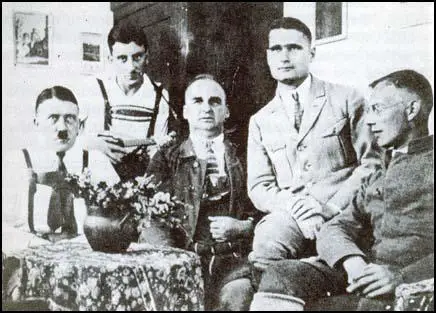
and Wilhelm Brückner at Landsberg.
Adolf Hitler praises Henry Ford in Mein Kampf for being successful in spite of the Jews in America. "It is Jews who govern the Stock Exchange forces of the American union. Every year makes them more and more the controlling masters of the producers in a nation of one hundred and twenty millions; only a single great man, Ford, to their fury, still maintains full independence." (10)
James Pool, the author of Who Financed Hitler: The Secret Funding of Hitler's Rise to Power (1979) has pointed out: "Not only did Hitler specifically praise Henry Ford in Mein Kampf, but many of Hitler's ideas were also a direct reflection of Ford's racist philosophy. There is a great similarity between The International Jew and Hitler's Mein Kampf, and some passages are so identical that it has been said Hitler copies directly from Ford's publication. Hitler also read Ford's autobiography, My Life and Work, which was published in 1922 and was a best seller in Germany, as well as Ford's book entitled Today and Tomorrow. There can be no doubt as to the influence of Henry Ford's ideas on Hitler." (11)
Hitler warned that the Aryan's superiority was being threatened by intermarriage. If this happened world civilization would decline: "On this planet of ours human culture and civilization are indissolubly bound up with the presence of the Aryan. If he should be exterminated or subjugated, then the dark shroud of a new barbarian era would enfold the earth." Although other races would resist this process, the Aryan race had a duty to control the world. This would be difficult and force would have to be used, but it could be done. To support this view he gave the example of how the British Empire had controlled a quarter of the world by being well-organised and having well-timed soldiers and sailors." (12)
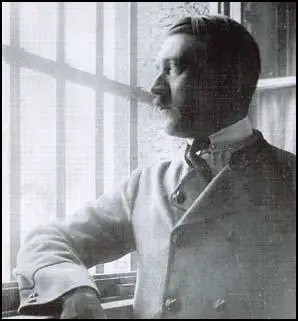
Adolf Hitler believed that Aryan superiority was being threatened particularly by the Jewish race who, he argued, were lazy and had contributed little to world civilization. (Hitler ignored the fact that some of his favourite composers and musicians were Jewish). He claimed that the "Jewish youth lies in wait for hours on end satanically glaring at and spying on the unconscious girl whom he plans to seduce, adulterating her blood with the ultimate idea of bastardizing the white race which they hate and thus lowering its cultural and political level so that the Jew might dominate."
According to Hitler, Jews were responsible for everything he did not like, including modern art, pornography and prostitution. Hitler also alleged that the Jews had been responsible for losing the First World War. Hitler also claimed that Jews, who were only about 1% of the population, were slowly taking over the country. They were doing this by controlling the largest political party in Germany, the German Social Democrat Party, many of the leading companies and several of the country's newspapers. The fact that Jews had achieved prominent positions in a democratic society was, according to Hitler, an argument against democracy: "a hundred blockheads do not equal one man in wisdom." (13)
Adolf Hitler argued that the Jews were involved with Communists in a joint conspiracy to take over the world. Like Henry Ford, Hitler claimed that 75% of all Communists were Jews. Hitler suggested that the combination of Jews and Marxists had already been successful in Russia and now threatened the rest of Europe. The communist revolution was an act of revenge that attempted to disguise the inferiority of the Jews. This is not supported by the facts. At the time of the Russian Revolution there were only seven million Jews among the total Russian population of 136 million. Although police statistics showed the ratio of Jews participating in the revolutionary movement to the total Jewish population was six times that of the other nationalities in Russia, they were no way near the figures suggested by Hitler and Ford. However, Jews had played a significant role in the revolution. Lenin admitted that "Jews provided a particularly high percentage of leaders of the revolutionary movement". He explained this by arguing "to their credit... Jews provide a relatively high percentage of representatives of internationalism compared with other nations." (14)
At the Social Democratic Party in London in 1903, 25 out of 55 delegates were Jews. Of the 350 delegates in the 1907 congress, nearly a third were Jews. However, an important point which the anti-Semites overlooked is that of the Jewish delegates, most supported the Mensheviks, whereas only 10% supported the Bolsheviks, who led the revolution in 1917. According to a party census carried out in 1922, Jews made up 7.1% of members who had joined before the revolution. Jewish leaders of the revolutionary period, Leon Trotsky, Gregory Zinoviev, Lev Kamenev, Karl Radek, Grigori Sokolnikov and Genrikh Yagoda were all purged by Joseph Stalin in the 1930s. (15)
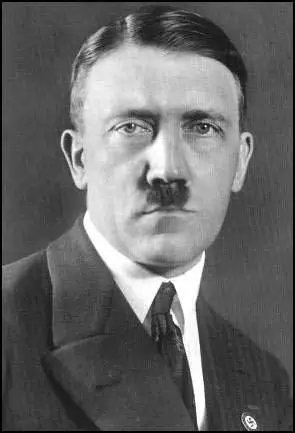
In Mein Kampf Hitler declared that: "The external security of a people in largely determined by the size of its territory. If he won power Hitler promised to occupy Russian land that would provide protection and lebensraum (living space) for the German people. This action would help to destroy the Jewish/Marxist attempt to control the world: "The Russian Empire in the East is ripe for collapse; and the end of the Jewish domination of Russia will also be the end of Russia as a state." (16)
To achieve this expansion in the East and to win back land lost during the First World War, Hitler claimed that it might be necessary to form an alliance with Britain and Italy. An alliance with Britain was vitally important because it would prevent Germany fighting a war in the East and West at the same time. According to James Douglas-Hamilton, the author of The Truth About Rudolf Hess (2016) Karl Haushofer provided "Hitler with a formula and certain well-turned phrases which could be adapted, and which at a later stage suited the Nazis perfectly". Haushofer had developed the theory that the state is a biological organism which grows or contracts, and that in the struggle for space the strong countries take land from the weak. (17)
In 1924 Kurt Lüdecke sent Winifred Wagner to the United States to obtain funds for the Nazi Party. This including meeting Henry Ford. She admitted to James Pool in 1977: "Ford told me that he had helped to finance Hitler with money from the sales of automobiles and trucks that he had sent to Germany." Wagner suggested that Hitler was now more in need for money than ever. Ford replied that he was still willing to support if he was still working to free Germany from the Jews. Wagner arranged for Ludecke to pay Ford a visit. (18)
At the arranged meeting, Lüdecke promised that as soon as Hitler came to power, one of his first acts would be to inaugurate the social and political program which had been advocated in the Dearborn Independent. Ludecke explained that money was the only obstacle that stood between the Nazis and the fulfillment in Germany of Ford and Hitler's mutual views. (19) In his memoirs published in 1938 Lüdecke did not say how much Ford gave to Hitler. Lüdecke hinted at why he could not tell the truth without hurting Ford. The Jewish boycott had "pinched him in the ledgers where even a multimillionaire is vulnerable." (20)
The Dawes Plan and the Nazi Party
Hitler was released from prison on 20th December, 1924, after serving just over a year of his sentence. The Germany of 1924 was dramatically different from the Germany of 1923. Charles G. Dawes, an American banker, was asked by the Allied Reparations Committee to investigate the economic problems. His report, published in April, 1924, proposed a plan for instituting annual payments of reparations on a fixed scale. He also recommended the reorganization of the German State Bank and increased foreign loans. The Dawes Plan was initially a great success. The currency was stabilized and inflation was brought under control. Large loans were raised in the United States and this investment resulted in a fall in unemployment. The German people gradually gained a new faith in their democratic system and began to find the extremist solutions proposed by people such as Hitler unattractive. (21)
In a speech Hitler made soon after leaving prison he associated himself with Martin Luther: "Martin Luther has been the greatest encouragement of my life. Luther was a great man. He was a giant. With one blow he heralded the coming of the new dawn and the new age. He saw clearly that the Jews need to be destroyed, and we're only beginning to see that we need to carry this work on.... I believe that today I am acting in accordance with the will of Almighty God as I announce the most important work that Christians could undertake - and that is to be against the Jews and get rid of them once and for all." (22)
Hitler claimed that he was no longer in favour of revolution but was willing to compete with other parties in democratic elections. This policy was unsuccessful and in the elections of December 1924 the NSDAP could only win 14 seats compared with the the 131 obtained by the Socialists (German Social Democrat Party) and the 45 of the German Communist Party. The non-violent Nationalist Party won 103 seats and the Catholic Centre Party achieved 88 seats. The votes cast for the NSDAP fell more than half, from 1,918,300 to 907,300, less than 5% of the total cast. (23)
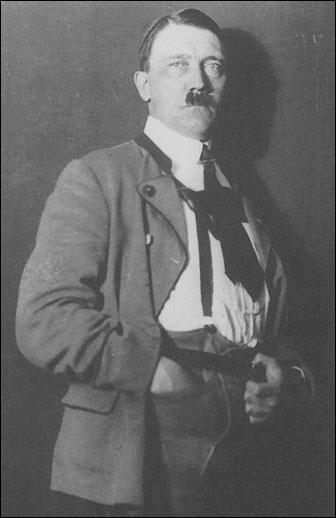
Adolf Hitler went to live in Berchtesgaden in the Bavarian Alps. Later he was to say this was the happiest time of his life. He spent his time reading, walking and being driven fast around the countryside in his new supercharged Mercedes. For the first time in his life he began to take a serious interest in women. Hitler liked the company of beautiful and frivolous women and avoided women who wanted to discuss political issues. His attitude towards women is reflected in his comment that: "A highly intelligent man should take a primitive and stupid woman." (24)
James Pool, the author of Who Financed Hitler: The Secret Funding of Hitler's Rise to Power (1979) has pointed out that Franz Schwarz was a very important figure in the Nazi Party: "The exact details of all the Nazi Party's business and financial affairs were worked out under the direction of Party treasurer Schwarz... He had started to work for the Nazis in 1924... Coming to see Hitler in Landsberg prison, the fat, bald, bespectacled Schwarz said that he was fed up with working for the petty individuals who controlled the Popular Block and would be pleased to work for the Nazis for a change." (25)
Despite losing votes in the elections, Hitler continued to attract new members. Otto Strasser first saw Hitler speak at a meeting in 1925. He later recalled in Hitler and I (1940): "Adolf Hitler enters a hall. He sniffs the air. For a minute he gropes, feels his way, senses the atmosphere. Suddenly he bursts forth. His words go like an arrow to their target, he touches each private wound on the raw, liberating the mass unconscious, expressing its innermost aspirations, telling it what it most wants to hear. If he tries to bolster up his argument with theories or quotations from books he has only imperfectly understood, he scarcely rises above a very poor mediocrity. But let him throw away his crutches and step out boldly, speaking as the spirit moves him, and he is promptly transformed into one of the greatest speakers of the century.... Hitler responds to the vibrations of the human heart with the delicacy of a seismograph, or perhaps of a wireless receiving set, enabling him, with a certainty with which no conscious gift could endow him, to act as a loud-speaker proclaiming the most secret desires, the least admissible instincts, the sufferings and personal revolts of a whole nation. But his very principle is negative. He only knows what he wants to destroy. He pulls down the walls without any idea of what he will build in their place." (26)
Otto and his brother, Gregor Strasser, both became active members of the Nazi Party. Adolf Hitler was highly suspicious of the brothers and disapproved of their socialist views. On 14th February, 1926, at the NSDAP annual conference, Gregor Strasser called for the destruction of capitalism in any way possible, including cooperation with the Bolsheviks in the Soviet Union. At the conference Joseph Goebbels supported Strasser but once he realised the majority supported Hitler over the Strasser brothers, he changed sides. From this point on Strasser began to call Goebbels "the scheming dwarf". (27)
Otto Strasser objected to the lack of democracy in the party. Hitler apparently replied: "You would give every Party member the right to decide on the idea - even to decide whether the leader is true to the so-called idea or not. This is democracy at its worst, and there is no place for such a view with us. With us the Leader and the Idea are one, and every Party member has to do what the leader orders. The Leader incorporates the Idea and alone knows its ultimate goal. Our organization is built up on discipline. I have no wish to see this organization broken up by a few swollen-headed litterateurs." (28)
Joseph Goebbels now became a strong supporter of Hitler. Both men were impressed with each other. Goebbels described one of their first meetings in his diary: "Hitler begins to speak. What a voice. What a gestures, what passion. Exactly what I had wanted from him. I can scarcely contain myself. My heart stands still. I hang on every word.... Shakes my hand. Like an old friend. And those big blue eyes. Like stars. He is glad to see me. I am in heaven. That man has everything to be king.... I am ready to sacrifice everything for this man. History gives peoples the greatest men in the greatest times of need." (29)
Hitler admired Goebbels' abilities as a writer and speaker. They shared an interest in propaganda and together they planned how the NSDAP would win the support of the German people. Hitler's first biographer, Konrad Heiden, attempted to explain how he managed to get the support of the German people: "The true aim of political propaganda is not to influence, but to study, the masses. The speaker is in constant communication with the masses; he hears an echo, and senses the inner vibration. In forever setting new and contradictory assertions before his audience, Hitler is tapping the outwardly shapeless substance of public opinion with instruments of varying metals and varying weights. When a resonance issues from the depths of the substance, the masses have given him the pitch; he knows in what terms he must finally address them. Rather than a means of directing the mass mind, propaganda is a technique for riding with the masses." (30)
Propaganda cost money and this was something that the Nazi Party was very short of at that time. Whereas the German Social Democratic Party was funded by the trade unions and the pro-capitalist parties by industrialists, the NSDAP had to rely on contributions from party members. When Hitler approached rich industrialists for help he was told that his economic policies (profit-sharing, nationalization of trusts) were too left-wing.
In an attempt to obtain financial contributions from industrialists, Hitler wrote a pamphlet in 1927 entitled The Road to Resurgence. Only a small number of these pamphlets were printed and they were only meant for the eyes of the top industrialists in Germany. The reason that the pamphlet was kept secret was that it contained information that would have upset Hitler's working-class supporters. In the pamphlet Hitler implied that the anti-capitalist measures included in the original twenty-five points of the NSDAP programme would not be implemented if he gained power.
Hitler began to argue that "capitalists had worked their way to the top through their capacity, and on the basis of this selection they have the right to lead." Hitler claimed that national socialism meant all people doing their best for society and posed no threat to the wealth of the rich. Some prosperous industrialists were convinced by these arguments and gave donations to the Nazi Party, however, the vast majority continued to support other parties, especially the right-wing German Nationalist Peoples Party. (31)
Adolf Hitler and Maria Reiter
Baldur von Schirach said Hitler was uncomfortable with women of his own age. He described one incident that took place when he was 34 years old: "Else Brummer... was one of the most beautiful girls... She deliberately went up to... Hitler, who looked at her unsuspectingly. She embraced him and kissed him tenderly on the mouth. The others watched. They found it funny that Hitler was being kissed so openly: he was already known at this time, but there was no talk about his being involved in any love affair. It would have been the most natural thing for him to kiss the girl back, but he didn't do that. As she moved away from him, he gazed at her solemnly, turned round and fetched his mackintosh. He took his black hat and without wishing anyone a happy new year, went out into the night." Hitler once said: "I detest women who dabble in politics." This was one of the reasons Hitler tended to be attracted to women much younger than himself. (32)
Herman Rauschning, the mayor of Danzig, who originally supported the Nazi Party, described the atmosphere around Adolf Hitler as a "reeking miasma of furtive unnatural sexuality that fills and fouls the whole atmosphere round him like an evil emanation. Nothing in this environment is straightforward-surreptitious relationships, substitutes and symbols, false sentiments, secret lusts nothing has the openness of a natural instinct." (33)
Rumours about Hitler's sex life reached Britain and one journalist, Rodney Collin, suggested that several of the senior figures in the Nazi Party were sexually abnormal. "Hitler, in whose life there has been no other woman but his mother, and Goering the alleged drug-addict, of whom one of his personal henchmen has said: 'The women all love him and he doesn't remember them for an hour.' Here are two sexual abnormals - the one with a childhood fixation, the other with the arrested adolescence of a Casanova. Both are unable to conceive the normal ideal of full and equal heterosexual love and marriage, on which the stability and beauty of any cultured society ultimately depend. So Hitler, with his back-to-the home slogan, endeavours to transform all German women to the mother of his ideal; while Goering, unfulfilled in private life, exercises a fanatical and compensatory blood-lust in public." (34)
In 1927 Hitler became involved with the sixteen-year-old Maria Reiter. It was just two weeks after her mother died of cancer. Hitler, who was 37 years old at the time, asked her out. Hitler appears to have been strongly attracted to teenagers. Maria later explained: "We went out into the night.... Hitler was about to put his arm around my shoulders and pull me toward him when the two dogs suddenly attacked each other.... Hitler suddenly intervened, like a maniac he hit his dog with his riding whip... and shook him violently by the collar. He was very excited.... I did not expect that he could hit his dog so brutally and ruthlessly, the dog which he had said he could not live without. Yet he beat up his most loyal companion." Maria asked him "How can you be so brutal and beat your dog like that?" He replied "It was necessary." (35)
Cate Haste, the author of Nazi Women (2001), has pointed out: "Hitler introduced himself to her when their paths crossed while walking their dogs. He pursued her, flirted with her, took her out on trips in his Mercedes and invited her to a meeting he was to address. She was impressed by his celebrity, and by his dress - by this time, breeches, light velour hat, riding whip and a coat held closed by a leather belt. In her later account, she recalls him taking her to dinner, feeding her cakes like a child, and touching her leg with his knee under the table. Hitler told her that she reminded him of his own mother, especially her eyes, and suggested they visit her mother's grave. There, she recalled, Hitler was overcome." Reiter later recalled: "he was moved by something he did not want to tell me... I am not ready yet." (36)
Ian Kershaw has argued in Hitler 1889-1936 (1998): "He (Hitler) was thirty-seven years of age; she was sixteen. Like his father, he preferred women much younger than himself - girls he could dominate, who would be obedient playthings but not get in the way. The two women with whom he would become most intimately associated, Geli Raubal (nineteen years younger than he was) and Eva Braun (twenty-three years younger), fitted the same model - until, that is, Geli became rebellious and wanted a level of freedom which Hitler was unwilling to permit." (37)
Ronald Hayman has suggested that there was a regular patten to Hitler's relationships: "Though he found it easy during his twenties and early thirties to make friends with children and with women in their forties and fifties, he was nervous of being rebuffed or humiliated by women of his own age. But at thirty-seven he was old enough to treat a teenage girl as if she were a child. With Maria, once they were sufficiently relaxed in each other's company, there was nothing to stop them from making love." (38)
They had several dates during which Hitler became increasingly passionate towards her. According to Reiter, Hitler "told her that he wanted her to be his wife, to found a family with her, to have blonde children, but at the moment he had not the time to think of such things. Repeatedly Hitler spoke of his duty, his mission." Hitler told her: "When I get my new apartment you have to stay with me... forever. We will choose everything together, the paintings, the chairs, I already can see it all: beautiful, big lounge chairs of the violet plush." After declaring his love to Maria, Hitler returned to Munich. (39)
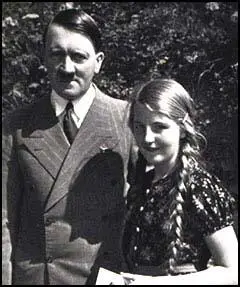
In February 1927 Hitler wrote to Maria: "My dear, good child, I was truly happy to receive this sign of your tender friendship to me... I am given a constant reminder of your cheeky head and your eyes... As regards what is causing you personal pain, you can believe me that I sympathize with you. But you should not let your little head droop in sadness and must only see and believe: even if fathers sometimes don't understand their children any longer because they have got older not only in years but in feelings, they mean only well for them. As happy as your love makes me, I ask you most ardently to listen to your father. And now, my dear treasure, receive warmest greetings from your Wolf, who is always thinking of you." (40)
Hitler sent her a a leather-bound copy of Mein Kampf for Christmas. Reiter gave him two sofa-cushions that she had embroidered. However, he did not visit her: "My whole world started tumbling down. I did not know what had happened, nothing... All sorts of pictures appeared in my mind... faces of other women and Hitler smiling at them. I did not want to go on living." Günter Peis points out: "In this depressed mood, she went to find a clothes-line. One end of it she slung around her neck, the other around a door handle. Slowly, she glided to the floor. Slowly, she lost consciousness." Luckily, her brother-in-law arrived and "saved her life at the last minute." (41)
Hitler sent a message that he was unable to see her because he was being blackmailed. According to Maria: "Hitler told my brother-in-law, that anonymous letters had been mailed to the party office saying that Hitler was having a relationship with a girl who was underage." The letter said: "Hitler seduces young, inexperienced girls. He just found a sixteen-year-old girl in Berchtesgaden who obviously will be his next victim." Hitler explained that he could not allow his relationship to "jeopardize the success of his party". (42)
Lothar Machtan has argued in The Hidden Hitler (2001) that the reason Hitler broke off his relationship with Maria was because he was being blackmailed by Emil Maurice, Hitler's chauffeur. "As early as 1927, Party headquarters had received some anonymous letters accusing Hitler of seducing a minor. It later transpired that their author was a certain Ida Arnold, a girlfriend of Maurice, who had invited Mimi to coffee and skillfully pumped her for information. Feeling cornered, Hitler requested Maria Reiter to make a sworn deposition to the effect that she had had 'no relationship of any kind' with him. Although this amounted to flagrant perjury, it must have seemed Hitler's only possible recourse in the summer of 1928. He was clearly under extreme pressure, because nothing could have presented a greater threat to him, as party leader, than revelations about his private life - and who knew more about that subject than Emil Maurice?" (43)
Schutzstaffeinel (SS)
Adolf Hitler decided he needed his own personal bodyguard and he established the Schutzstaffeinel (SS). The word Schutzstaffel means "defence echelon". As Louis L. Snyder has pointed out: "The name was universally abbreviated to SS, not in Roman or Gothic letters but written as a lightening flash in imitation of ancient runic characters. The SS was known as the Black Order." (44)
Julius Schreck became its first leader and he was told that the SS was an independent organization alongside, but subordinate to, the Sturm Abteilung (SA). Andrew Mollo, the author of To The Death's Head: The Story of the SS (1982) has argued: "Although mostly unemployed, SS men were expected to provide their own uniforms which also differed from those of the SA. SS men wore the brown shirt but, unlike the SA, they had a black cap adorned with a silver death's head, a black tie and black breeches, and the swastika armband was withdrawn from SS men who had infringed minor regulations." (45)
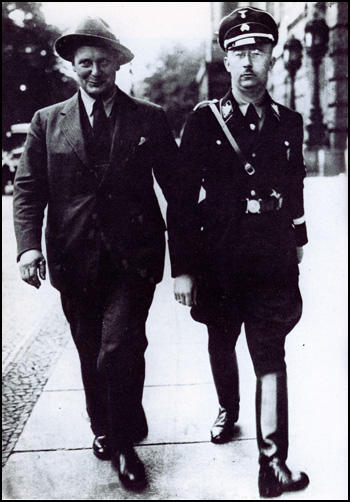
On 5th January 1929, Heinrich Himmler was appointed as the new head of the SS. Hitler was impressed by Himmler's fanatical nationalism and his deep hatred of the Jews. Himmler believed Hitler was the Messiah that was destined to lead Germany to greatness. At that time the SS consisted of 300 men. Himmler personally vetted all applicants to make sure that all were good "Aryan" types. Himmler later remembered that: "In those days we assembled the most magnificent Aryan manhood in the SS-Verfugungstruppe. We even turned down a man if he had one tooth filled." (46)
Industrialists and the Nazi Party
In 1927 Hitler was introduced to Emil Kirdorf, a very wealthy industrialist. Although Kirdorf agreed with most of Hitler's views he was concerned about some of the policies of the Nazi Party. He was particularly worried about the opinions of some people in the party such as Gregor Strasser who talked about the need to redistribute wealth in Germany. Hitler tried to reassure Kirdorf that these policies were just an attempt to gain the support of the working-class in Germany and would not be implemented once he gained power. Kirdorf suggested that Hitler should write a pamphlet for private distribution amongst Germany's leading industrialists that clearly expressed his views on economic policy. (47)
Kirdorf and his wealthy right-wing friends were particularly attracted to Hitler's idea of winning the working class away from left-wing political groups such as the Social Democratic Party and the Communist Party. Kirdorf and other business leaders were also impressed with the news that Hitler planned to suppress the trade union movement once he gained power. Kirdorf joined the Nazi Party and immediately began to try and persuade other leading industrialists to supply Hitler with the necessary funds to win control of the Reichstag. Kirdorf gave the party "100,000 Marks that went a long way towards overcoming the party's immediate financial plight." (48)
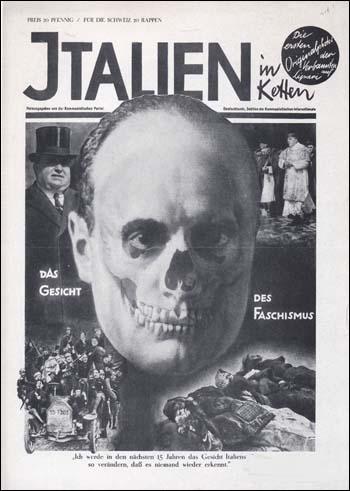
(Copyright The Official John Heartfield Exhibition & Archive)
Otto Dietrich later recalled: "Our Führer suddenly decided to concentrate systematically on cultivating the influential economics magnates... In the following months he traversed Germany from end to end, holding private interviews with prominent personalities. Any rendezvous was chosen, either in Berlin or in the provinces, in the Hotel Kaiserhof or in some lonely forest-glade. Privacy was absolutely imperative, the Press must have no chance of doing mischief." (49)
Kirdorf expected Adolf Hitler to remove left-wing members of the Nazi Party such as Gregor Strasser, Ernst Roehm and Gottfried Feder to be removed from power. When this did not happen, Kirdorf switched his support to the German Nationalist Party (DNVP) led by Alfred Hugenberg. Although no longer a member of the party, Kirdorf was still willing to arrange for Hitler to meet important industrialists at his home. (50)
The German economy continued to improve and as unemployment fell, so did the support for extremist political parties such as the NSDAP. In the General Election held in May, 1928, the Nazi Party won only 12 seats, while the left-wing parties, the German Social Democrat Party (153) and the German Communist Party (54) still continued to grow in popularity. Less than 3% of the people voted for the Nazi Party. However, the party was well organized and membership had grown from 27,000 in 1925 to 108,000 in 1928. (51)
Geli Raubal
In August 1928 Hitler had asked his half-sister, Angela Raubal, to be his housekeeper. She agreed and arrived with her 20 year-old daughter, Geli Raubal. The 39 year-old Hitler soon fell in love with her and became her constant companion at meetings, restaurants, conferences and on walks in the mountains. In 1929 Hitler took an apartment in Munich's Prinzregentenstrasse and the Raubal family moved in with him. (52)
Geli became a close friend of Henriette Hoffmann, the young daughter of Heinrich Hoffmann, Hitler's official photographer. Hitler told Otto Wagener: "I can sit next to young women who leave me completely cold. I feel nothing, or they actually irritate me. But a girl like the little Hoffmann or Geli (Raubal) - with them I become cheerful and bright, and if I have listened for an hour to their perhaps silly chatter - or I have only to sit next to them - then I am free of all weariness and listlessness I can go back to work refreshed." (53)
Hitler once commented: "A girl of eighteen to twenty is as malleable as wax. It should be possible for a man, whoever the chosen woman may be, to stamp his own imprint on her. That's all the woman asks for." Joachim Fest, the author of Hitler (1973), wrote that Hitler became obsessed with Geli: "The affection Hitler felt for this pretty, superficial niece soon developed into a passionate relationship hopelessly burdened by his intolerance, his romantic ideal of womanhood and avuncular scruples." (54)
Patrick Hitler, the son of Adolf's brother, Alois Hitler, met her during this period: "Geli looks more like a child than a girl. You couldn't call her pretty exactly, but she had great natural charm. She usually went without a hat and wore very plain clothes, pleated skirts and white blouses. No jewellery except a gold swastika given to her by Uncle Adolf, whom she called Uncle Alf." (55)
Hitler became infatuated with Geli and rumours soon spread that he was having an affair with his young niece. Hitler told Heinrich Hoffman: "You know, Hoffmann, I'm so concerned about Geli's future that I feel I have to watch over her. I love Geli and could marry her. Good! But you know what my viewpoint is. I want to remain single. So I retain the right to exert an influence on her circle of friends until such a time as she finds the right man. What Geli sees as compulsion is simply prudence. I want to stop her from falling into the hands of someone unsuitable." (56)
Adolf Hitler also took her with him to meetings. Baldur von Schirach commented: "The girl at Hitler's side was of medium size, well developed, had dark, rather wavy hair, and lively brown eyes. A flush of embarrassment reddened the round face as she entered the room with him, and sensed the surprise caused by his appearance. I too stared at her for a long time, not because she was pretty to look at but because it was simply astonishing to see a young girl at Hitler's side when he appeared at a large gathering of people. He chatted animatedly to her, patted her hand and scarcely paused long enough for her to say anything. Punctually at eleven o'clock he stood up to leave the party with Geli, who had gradually become more animated. I had the impression Geli would have liked to stay longer." (57)
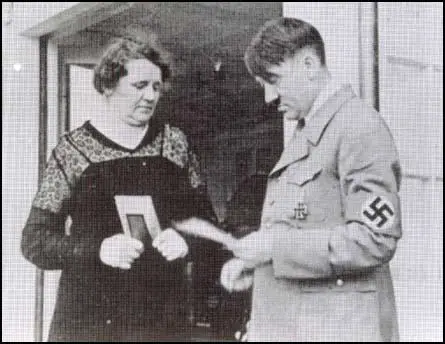
The couple lived together for over two years. The relationship with Geli was stormy and they began to accuse each other of being unfaithful. Geli was particularly concerned about Eva Braun, a seventeen-year-old girl who Hitler took for rides in his Mercedes car. Henriette Hoffman knew Eva, who worked in her father's studio. She recalled that "Eva had pale blonde hair, cut short, blue eyes, and, although she had been educated in a Catholic convent, she had learnt feminine wiles - a certain look, and swaying hips when she walked, which made men turn their heads." According to his biographer, Ian Kershaw, "for the first time in his life (if we leave out his mother out of consideration) he became emotionally dependent on a woman." (58)
Ernst Hanfstaengel, who had a close relationship with Hitler at the time suggested that Geli was willing "to submit to his peculiar tastes" and was the "one woman in his life who went some way towards curing his impotence and half making a man out of him." He went on to say "that the services she was prepared to render had the effect of making him behave like a man in love... he hovered at her elbow with a moon-calf look in his eyes in a very plausible imitation of adolescent infatuation." (59)
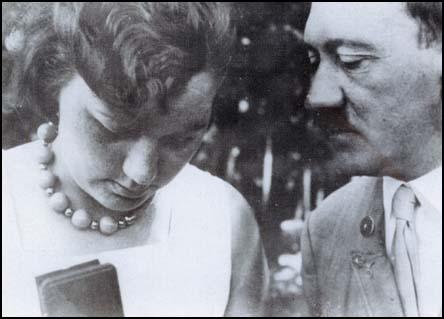
Anni Winter, Hitler's housekeeper, claimed: "Geli loved Hitler. She was always running after him. Naturally, she wanted to be become Frau Hitler... He was highly eligible... but she flirted with everybody; she was not a serious girl." Emil Maurice commented: "He liked to show her off everywhere; he was proud of being seen in the company of such an attractive girl. He was convinced that in this way he impressed his comrades in the party, whose wives or girlfriends nearly all looked like washerwomen." (60)
Baldur von Schirach wrote in his autobiography: "He (Hitler) followed her into millinery shops and watched patiently while she tried on all the hats and then decided on a beret. He sniffed at the sophisticated French perfumes she enquired about in a shop on the Theatinerstrasse, and if she didn't find what she wanted in a shop, he trotted after her... like a patient lamb. She exercised the sweet tyranny of youth, and he liked it, he was more cheerful, happier person." (61)
Wall Street Crash
Adolf Hitler constantly argued that German prosperity would not last and warned that the country was about to suffer an economic recession. The fortunes of the NSDAP changed with the Wall Street Crash in October 1929. Desperate for capital, the United States began to recall loans from Europe. One of the consequences of this was a rapid increase in unemployment. Germany, whose economy relied heavily on investment from the United States, suffered more than any other country in Europe. (62)
With the drop in demand for labour, wages also fell and those with full-time work had to survive on lower incomes. Hitler, who was considered a fool in 1928 when he predicted economic disaster, was now seen in a different light. Hitler told a Munich audience: "We are the result of the distress for which the others were responsible." People began to say that if he was clever enough to predict the depression maybe he also knew how to solve it. (63)
The German Social Democrat Party was the largest party in the Reichstag, but it did not have a majority over all the other parties, and the SPD leader, Hermann Muller, had to rely on the support of others to rule Germany. By the end of 1930 the figure had reached nearly 4 million (it was only 1.25 million people before the Wall Street crash). Even those in work suffered as many were only working part-time. Those right-wing parties in the coalition government insisted that Muller reduce unemployment benefits. When he refused he was replaced as Chancellor by Heinrich Bruening. However, with his party only having 87 representatives out of 577 in the Reichstag, he also found it extremely difficult to gain agreement for his policies. (64)
In the General Election that took place in September 1930, the Nazi Party increased its number of representatives in parliament from 14 to 107. Hitler was now the leader of the second largest party in Germany. Harold Harmsworth, 1st Lord Rothermere, wrote in The Daily Mail after the general election result: "What are the sources of strength of a party which at the general election two years ago could win only 12 seats, but now, with 107, has become the second strongest in the Reichstag, and whose national poll has increased in the same time from 809,000 to 6,400,000? Striking as these figures are, they stand for something far greater than political success. They represent the rebirth of Germany as a nation." (65)
James Pool, the author of Who Financed Hitler: The Secret Funding of Hitler's Rise to Power (1979) points out: "Shortly after the Nazis' sweeping victory in the election of September 14, 1930, Rothermere went to Munich to have a long talk with Hitler, and ten days after the election wrote an article discussing the significance of the National Socialists' triumph. The article drew attention throughout England and the Continent because it urged acceptance of the Nazis as a bulwark against Communism... Rothermere continued to say that if it were not for the Nazis, the Communists might have gained the majority in the Reichstag." (66) It has been argued by Louis P. Lochner,that Rothermere provided funds to Hitler via Ernst Hanfstaengel during this period." (67)
Chancellor Heinrich Bruening failed to persuade the German Social Democrat Party and the Communist Party to accept his plans to reduce public expenditure. He therefore had to rely on emergency decrees signed by President Paul von Hindenburg. His austerity programme included cuts in unemployment benefit and official salaries and state expenditure generally. As a result of these measures unemployment continued to rise and by the end of 1930 it had reached 4,887,000. It has been pointed out that these "figures showed less than the full truth as they took no account of short-time working and people out of work who were not qualified for benefit." (68)
President Hindenburg, who was 83 years-old and suffering from senility, relied heavily on the advice of General Kurt von Schleicher. It has been suggested that this suggested an important move in the power structure of Germany as it indicated that the military were now making the important decisions: "The vision of German democracy was over, little as the German democrats knew it... The new religion, which actually was no more than the old Prussian religion, was preached everywhere." (69)
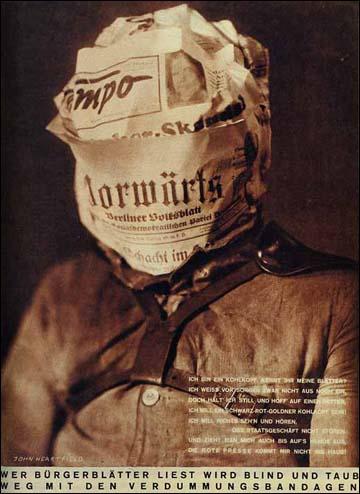
become blind and deaf, Arbeiter-Illustrierte-Zeitung (AIG) (February 1930)
(Copyright The Official John Heartfield Exhibition & Archive)
Hitler claimed that parliamentary democracy did not work and only he could provide the strong government that Germany needed. Hitler and other Nazi leaders travelled round the country giving speeches putting over this point of view. What Hitler said depended very much on the audience. In rural areas he promised tax cuts for farmers and government action to protect food prices. In working class areas he spoke of redistribution of wealth and attacked the high profits made by the large chain stores. When he spoke to industrialists, Hitler concentrated on his plans to destroy communism and to reduce the power of the trade union movement. Hitler's main message was that Germany's economic recession was due to the Treaty of Versailles. Other than refusing to pay reparations, Hitler avoided explaining how he would improve the German economy. (70)
Death of Geli Raubal
Adolf Hitler continued to live with Geli Raubal. However, Geli's friend, Henriette Hoffmann, claims that Geli grew more and more indifferent to him while he grew more and more passionate about her. Geli began seeing other men. Wilhelm Stocker, an SA officer, was often on guard duty outside Hitler's Munich flat, later told the author of Eva and Adolf (1974): "Many times when Hitler was away for several days at a political rally or tending to party matters in Berlin or elsewhere, Geli would associate with other men. I liked the girl myself so I never told anyone what she did or where she went on these free nights. Hitler would have been furious if he had known that she was out with such men as a violin player from Augsburg or a ski instructor from Innsbruck." (71)
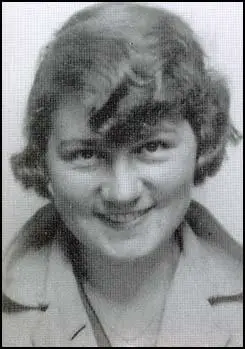
Geli also began a relationship with Emil Maurice, Hitler's chauffeur and bodyguard. Maurice later told Nerin E. Gun, the author of Eva Braun: Hitler's Mistress (1969), about Geli. He testified that, "her big eyes were a poem and she had magnificent hair... people in the street would turn round to take another look at her, though people don't do that in Munich." Maurice was aware that Hitler was very interested in Geli: "He liked to show her off everywhere; he was proud of being seen in the company of such an attractive girl. He was convinced that in this way he impressed his comrades in the party." (72)
Maurice admitted that he was "madly in love" with Geli and "I decided to become engaged to Geli... she gladly accepted my proposal". Henriette Hoffmann believes that Geli was in love with Maurice: "He was a sensitive man, not just someone who took pride in fighting, and there was a genuine tenderness behind his affability." Geli told Henriette that she no longer wanted to be loved by Hitler and preferred her relationship with Maurice: "Being loved is boring, but to love a man, you know, to love him - that's what life is about. And when you can love and be loved at the same time, it's paradise." (73)
Ernst Hanfstaengel believes that Geli had turned away from Hitler because of his perverted sexual desires. This idea is supported by Wilhelm Stocker: "She (Geli) admitted to me that at times Hitler made her do things in the privacy of her room that sickened her but when I asked her why she didn't refuse to do them she just shrugged and said that she didn't want to lose him to some woman that would do what he wanted. She was a girl that needed attention and needed it often. And she definitely wanted to remain Hitler's favourite girlfriend. She was willing to do anything to retain that status. At the beginning of 1931 I think she was worried that there might be another woman in Hitler's life because she mentioned to me several times that her uncle didn't seem to be as interested in her as he once was." (74)
Geli Raubal told Otto Strasser after one large argument with Hitler: "She told me that she really loved Hitler, but she couldn't bear it any longer. His jealously wasn't the worst thing. He demanded things from her that were simply disgusting. She had never dreamed that such things could happen. When I asked her to tell me, she described things I had previously encountered in my reading of Krafft-Ebing's Psychopathia Sexualis when I was a student." (75)
Strasser later went into more detail about this when he was interviewed by officials of the US Officer of Strategic Studies in 1943. "Hitler made her undress.... He would lie down on the floor. Then she would have to squat over his face, where he could examine her at close range and this made him very excited. When the excitement reached its peak, he demanded that she urinate on him and this gave him sexual pleasure. Geli said the whole performance was extremely disgusting to her and... it gave her no gratification." (76)
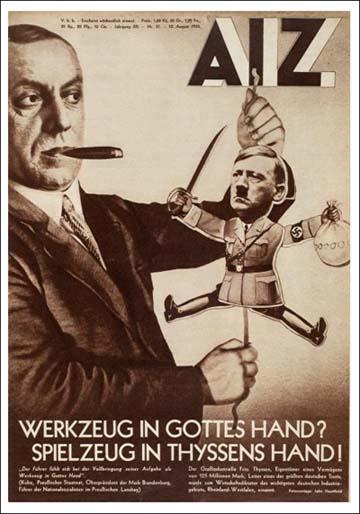
(Copyright The Official John Heartfield Exhibition & Archive)
Heinrich Hoffmann claimed in his book, Hitler was my Friend (1955) that that Geli found Hitler's controlling behaviour unpleasant: "The pressure under which Geli lives is burdensome to her, and what makes matters worse is that she's prevented from saying how unhappy she feels.... The ball gave her no pleasure. It merely reminded her of how little freedom she has.... Certainly, it flattered her that her serious and unapproachable uncle, who was so good at hiding his feelings from everybody else, was fond of her. She wouldn't have been a woman if she hadn't been flattered by Hitler's gallantry and generosity. But it seemed simply intolerable to this child of nature that he should want to mother her every step and that she shouldn't be allowed to speak to anyone without his knowledge." (77)
Ernst Hanfstaengel suggests that Geli disliked his violent behaviour. In his autobiography he describes a visit to the Schwarzwälder Café: "Discussing politics as they politics as they walked through the streets after the meal, Hitler emphasised some threat against his opponents by cracking the heavy dog whip he still affected. I happened to catch a glimpse of Geli's face as he did it, and there was on it such a look of fear and contempt that I almost caught my breath. Whips as well, I thought, and really felt sorry for the girl. She had displayed no sign of affection for him in the restaurant and seemed bored, looking over her shoulder at the other tables, and I could not help feeling that her share in the relationship was under compulsion." (78)
Ian Kershaw has argued in Hitler 1889-1936 (1998): "When Hitler found out about Geli's liaison with Emil Maurice, his bodyguard and chauffeur, there was such a scene that Maurice feared Hitler was going to shoot him." Geli wrote to Maurice: "The postman has already brought me three letters from you, but never have I been so happy as I was over the last. Perhaps that's the reason we've had such bad experiences over the last few days. Uncle Adolf is insisting that we should wait two years. Think of it, Emil, two whole years of only being able to kiss each other now and then and always having Uncle Adolf in charge. I can only give you my love and be unconditionally faithful to you. I love you so infinitely much. Uncle Adolf insists that I should go on with my studies." (79)
According to Ronald Hayman, the author of Hitler & Geli (1997), there are three versions of what afterwards happened to Maurice. He points out that Ernst Hanfstaengel believes that, instead of sacking him, Hitler "gradually started to freeze him out, fell behind in paying his wages, and in the end Maurice himself made the break." Another story is that Otto Strasser overheard a conversation in which Hitler told Maurice he was never to set foot in the house again, and Maurice replied: "Sack me, and I'll take the whole story to the Frankfurter Zeitung!" Hitler gave in to the threat. "The third version is that Hitler threatened to sack Maurice unless he broke off the engagement, and implemented his threat when Maurice tried to defy him. It is possible that all three stories are untrue." Maurice was eventually sacked by Hitler. (80)
Christa Schroeder, Hitler's private secretary, claims that Geli fell in love with another man who has never been named. Apparently, he wanted to marry Geli and wrote to her in 1931: "Now your uncle, who knows how much influence he has over your mother, is trying to exploit her weakness with boundless cynicism. Unfortunately we won't be in a position to fight back against this blackmail until after you're twenty-one. He's putting obstacles in the way of our mutual happiness although he knows that we're made for each other. The year of separation your mother is imposing on us will only bind us together more closely. Because I'm always very strict with myself about thinking and behaving in a direct way, I find it hard to accept when other people don't do that. But your uncle's behaviour towards you can only be interpreted as egoistic. He quite simply wants you to belong to him one day and never to anyone else.... Your uncle still sees you as the 'inexperienced child' and refuses to acknowledge that in the meantime you've grown up and want to take responsibility for your own happiness. Your uncle is a force of nature. In his party they all bow down to him like slaves. I don't understand how his keen intelligence can mislead him into thinking his obstinacy and his theories about marriage can destroy our love and our willpower. He's hoping to succeed this year in changing your mind, but how little he knows your soul." (81)
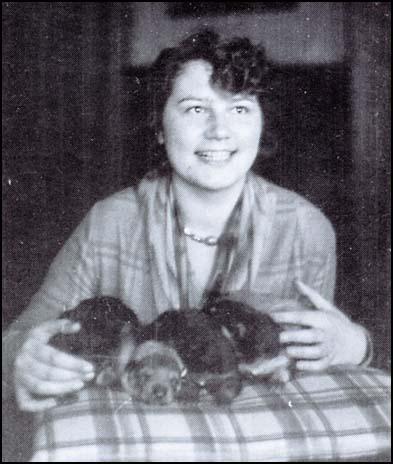
Ernst Hanfstaengel later wrote that Karl Anton Reichel told him that Hitler had shown him a letter he had recently written to Geli: "It was couched in romantic, even anatomical terms and could only be read in the context of a farewell letter of some sort. Its most extraordinary aspect was a pornographic drawing which Reichel could only describe as a symbol of impotence. Why on earth he should have been shown this letter I cannot imagine, but he was not the man to make up such a story." (82)
Hitler insisted that Geli Raubal and her friend, Henriette Hoffmann, received weapons training. They were both encouraged to carry loaded pistols around with them and they practiced shooting on a rifle range just outside Munich; they were taught how to use a safety catch and how to clean a Walther 6.35 pistol, taking it to pieces and putting it together again. Henriette said they enjoyed this as it made them feel like characters in a Western. (83)
Geli continued to complain about the way Hitler controlled her life. Bridget Hitler claimed that her son told her a story that he had got from Anni Winter, Hitler's housekeeper. She had overheard an argument about Geli wanting to go and stay in Vienna. Geli was very upset because he had originally given his approval but then changed his mind. Bridget heard Hitler say: "You say you have to go to Vienna? Is it to see that filthy Jew, the one who claims to be a singing teacher? Is that it? Have you been seeing him secretly again? Have you forgotten I forbade you to have anything to do with him? Tell me the truth now. Why do you want to go to Vienna?" According to Bridget she replied: "I have to go to Vienna, Uncle Alf, because I'm going to have a baby." (84)
Ronald Hayman, the author of Hitler & Geli (1997) has suggested: "What seems to have happened shortly before Geli died is that Hitler, who often changed his mind at the last minute, reversed his decision about letting her go to Vienna. It is quite likely that the other Nazi leaders were putting pressure on him. Though they would all have been glad to get rid of her, they may have told him it was unsafe to set her free: she knew too much. They may have found out that she had confided in other men about Hitler's sexual habits, and Schwarz knew she had modelled for his pornographic drawings. If she talked indiscreetly in Vienna, stories might get picked up by the liberal press at the worst." (85)
On the morning of Saturday, 19th September, 1931, Geli Raubal's body was found on the floor of her room in the flat, by Georg Winter, the husband of Hitler's housekeeper. In a statement later given to the police he explained what had happened that morning: "As the thing seemed to me rather suspicious, at ten o'clock I forced the double-door open with a screwdriver... As I'd opened the door I stepped into the room and found Raubal lying on the floor as a corpse. She'd shot herself. I can't give any reason why she should have shot herself." (86)
It was later revealed that the previous evening, Hitler left for Hamburg as part of his electioneering in North Germany. It was alleged that they had quarrelled before his departure. Angela Raubal, Geli's mother, later said she wanted to marry a violinist from Linz, but she and her half-brother had forbidden her to see the man. Cate Haste has suggested she may have been pregnant by a Jewish lover in Vienna. (87)
A meeting was held by leading officials in the Nazi Party before the police was called. This included Franz Schwarz, Gregor Strasser, Baldur von Schirach, Max Amann and Rudolf Hess. They discussed what they should do before the police were brought to Hitler's apartment: "We know that a top-level conference of Munich Nazis was held in his flat during the morning of Saturday, 19 September, though we do not know what time it began or who convened it.... Eventually Schirach telephoned Adolf Dresler of the press department at the Brown House, instructing him to tell the press that Hitler had gone into deep mourning after his niece's suicide. But they went on arguing about whether this was the best line to take, and they decided it was not. Schirach made another call to Dresler, telling him to say it had been an accident." (88)
The Münchener Neueste Nachrichten reported the following day. "According to a police communique, a twenty-three-year-old student fired a pistol aimed at the heart in a room of her flat in the Bogenhausen district. The unfortunate young woman, Angela Raubal, was the daughter of Adolf Hitler's half-sister, and she and her uncle lived on the same floor of a block of flats on Prinzregentenplatz. On Friday afternoon the owners of the flat heard a cry but it did not occur to them that it came from their tenant's room. When there was no sign of life from this room in the course of the evening, the door was forced. Angela Raubal was found lying face down on the floor, dead. Near her on the sofa was a small-calibre Walther pistol." (89)
The Münchener Post carried a story that suggested that the newspaper was relying on inside information. "On Friday 18 September there was once again a violent quarrel between Herr Hitler and his niece. What was the reason? The vivacious 23-year-old music student, Geli, wanted to go to Vienna, she wanted to become engaged. Hitler was strongly opposed to this. The two of them had recurrent disagreements about it. After a violent scene, Hitler left his flat on the second floor of 16 Prinzregentenplatz... The dead woman's nose was broken, and there were other serious injuries on the body. From a letter to a female friend living in Vienna, it is clear that Fraulein Geli had the firm intention of going to Vienna. The letter was never posted." (90)
The unfinished letter was not a suicide note. It was addressed to someone in Vienna. The police report said that it was to a girlfriend but Baldur von Schirach has claimed it was to her music teacher. The tone was cheerful, and the letter broke off in the middle of the sentence: "When I come to Vienna - I hope very soon - we'll drive together to Semmering an..." (Semmering is an attractive health resort outside Vienna.) Some historians have suggested that it was highly unlikely that someone would start a letter arranging a future holiday before committing suicide. (91)
Adolf Hitler reacted strongly against this news report. He issued a statement: "(1) It is untrue that I had either 'recurrent disagreements' or 'a violent quarrel' with my niece Angela Raubal on Friday 18 September or previously. (2) It is untrue that I was 'strongly opposed' to my niece's travelling to Vienna. The truth is that I was never against the trip my niece had planned to Vienna. (3) It is untrue that my niece wanted to become engaged in Vienna or that I had some objection to my niece's engagement. The truth is that my niece, tortured by anxiety about whether she really had the talent necessary for a public appearance, wanted to go to Vienna in order to have a new assessment of her voice by a qualified voice specialist. (4) It is untrue that I left my flat on 18 September 1931 'after a violent scene'. The truth is that there was no kind of scene and no agitation of any kind when I left my flat on that day." (92)
Dr. Muller, the police doctor who signed the death certificate dismissed the idea that Geli Raubal had been beaten up before the suicide. "On the face and especially on the nose were to be found no wounds connected with the bleeding of any kind. Nothing was to be found on the face except dark greyish death-marks which had proceeded from the fact that Raubal expired with her face to the floor and remained in that position for about 17-18 hours. That the tip of the nose was pressed slightly flat is due entirely to her lying with her face on the floor for several hours. The extreme discoloration of the death-marks in the face is probably to be explained by the fact that death was primarily consequent on suffocation following the shot in the lung." (93)
According to the police report, Geli Raubal had been bleeding from a wound near her heart and her clothes were soaked with blood. She was lying face downwards, with her nose against the floor. One arm was stretched out towards the pistol, a Walther 6.35, which was on the couch. The bullet, which had missed her heart, had pierced her lung. Still in her body, it had lodged on the left side of her back above the level of her hip. Ronald Hayman has pointed out: "This means that if she was standing or sitting when the shot was fired, the barrel of the pistol was pointing downwards, and the hand holding it was higher than her heart. Even if she was lying on the couch or the floor, it would not have been easy for her to shoot herself in this way. And why should she want to? Having been taught how to use a Walther, she could, if she wanted to kill herself, easily have avoided such a slow and painful death." (94)
Unfortunately, there was no inquest, and only one doctor examined her body before it was released, taken out of the country. One of the advantages of having the body taken across the frontier was that this would rule out any possibility of exhuming her for an inquest. Franz Gürtner, the Minister of Justice in Bavaria, was in a good position to cover up if she had been murdered. He held extreme right wing views and protected the Nazis during this period. According to Heinrich Hoffmann, it was her mother, Angela Raubaul, who decided that her daughter should be buried in Vienna. (95)
Geli Raubal was given a Catholic funeral when she was buried at the Zentralfriedhof Cemetery on 23rd September, 1931. Of course, people who had committed suicide were not allowed to have a Catholic funeral. Father Johann Pant, who conducted the service, later said that he could not have done what he did if Geli had died by her own hand. Pant, who had known Hitler for over twenty years, was obviously convinced that Geli had been murdered. He later fled Nazi Germany and went to live in Paris. In 1939 he wrote to the Courier d'Autriche newspaper: "They pretended that she committed suicide; I should never have allowed a suicide to be buried in consecrated ground. From the fact that I gave her Christian burial you can draw conclusions which I cannot communicate to you." (96)
Angela Raubal, later claimed: "I can't understand why she did it. Perhaps it was an accident, and Geli killed herself while she was playing with the pistol which she got from him (Hitler)." Otto Wagener, who worked for Hitler, believes the death was an accident: "The bullet's trajectory showed that she had the pistol in her left hand with the barrel towards her body. Since she was sitting at her desk and writing a totally innocent letter which was unfinished, we must assume that it came into her head to fetch the pistol and check whether it was loaded, at which point it went off and hit her in the heart - an unfortunate accident." (97)
Ian Kershaw also believes it was an accident: "Hitler's political enemies had a field day. There were no holds barred on the newspaper reports. Stories of violent rows and physical mistreatment mingled with sexual innuendo and even the allegation that Hitler had either killed Geli himself or had had her murdered to prevent scandal. Hitler himself was not in Munich when his niece died. And it is not easy to see the reasoning for a commissioned murder to prevent a scandal being carried out in his own flat. As it was, the scandal was enormous." (98)
Rudolf Hess believed that Geli Raubal had been killed by a jealous woman who got into the flat during the night. The anti-Nazi journalist, Konrad Heiden, has argued that Geli was pregnant by a Jewish man and that just before her death she was visited by Heinrich Himmler. He told her that she had "betrayed the man who was her guardian, her lover and her Führer in one - according to National Socialist conceptions there was only one way of making good such a betrayal." heiden points out that the man who told him this story, Father Bernhard Stempfle, was murdered on the orders of Hitler on 30th June, 1934. (99)
Six years after Geli's death Bridget Hitler visited Ernst Hanfstaengel, who was then living in London. Bridget told Hanfstaengel that she was convinced that it was suicide rather than murder. She claimed that "the immediate family knew very well that the cause of Geli's suicide was the fact that she was pregnant by a young Jewish art teacher in Linz, whom she had met in 1928 and wanted to marry at the time of her death." (100)
Henriette Hoffmann believed that Geli had killed herself: "He (Hitler) fenced her life so tightly, confined her in such a narrow space that she saw no other way out. Finally she hated her uncle, she really wanted to kill him. She couldn't do that. So she killed herself, to hurt him deeply enough, to disturb him. She knew that nothing else would wound him so badly. And because he knew too, he was so desperate, he had to blame himself." (101)
Rudolf Hess claimed that Hitler became suicidal because of the rumours that he had shot Geli Raubal. "He was so fearfully vilified by this new campaign of lies that he wanted to make an end of everything. He could no longer look at a newspaper because this frightful filth was killing him. He wanted to give up politics and never again appear in public."
One consequence of Geli's suicide was that Hitler became a vegetarian. He claimed that meat now reminded him of Geli's corpse. Alan Bullock, the author of Hitler: A Study in Tyranny (1962) has argued that Geli's death dealt him "a greater blow than any other event in his life. For days he was inconsolable and his friends feared he would take his own life... For the rest of his life he never spoke of Geli without tears coming to his eyes; according to his own statement to a number of witnesses, she was the only woman he ever loved." (102)
Ernst Hanfstaengel wrote in The Missing Years (1957): "I am sure that the death of Geli Raubal marked a turning point in the development of Hitler's character. This relationship, whatever form it took in their intimacy, had provided him for the first time in his life with a release to his nervous energy which only too soon was to find its final expression in ruthlessness and savagery. His long connection with Eva Braun never produced the moon-calf interludes he had enjoyed with Geli and which might in due course, perhaps, have made a normal man out of him. With her death the way was clear for his final development into a demon, with his sex life deteriorating again into a sort of bisexual narcissus-like vanity, with Eva Braun little more than a vague domestic adjunct." (103)
Chancellor Adolf Hitler
After acquiring German citizenship on 25th February, 1932, Hitler decided to test his party's strength by running for the Presidency. The aging incumbent, Paul von Hindenburg had the support of the Social Democratic Party, the Catholic Centre Party and the German trade union movement. There was one other main candidate, Ernst Thälmann, the leader of the The Communist Party (KPD). Hitler staged an energetic campaign for the elections held on 10th April. Hindenburg was now 84 years old and was showing signs of senility. However, a large percentage of the German population still feared Hitler and in the election Hindenburg won 53% of the vote (19,359,650). Hitler came second with 13,418,011 and Thälmann was a poor third (3,706,655). Hitler had managed to persuade people that he was the "candidate of the workers and the masses in opposition to Hindenburg". (104)
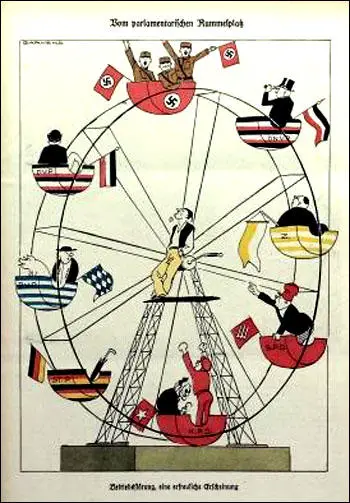
Chancellor Heinrich Brüning and other senior politicians were worried that Hitler would use his stormtroopers to take power by force. Led by Ernst Roehm, it now contained over 400,000 men. Under the terms of the Treaty of Versailles the official German Army was restricted to 100,000 men and was therefore outnumbered by the SA. In the past, those who feared communism were willing to put up with the SA as they provided a useful barrier against the possibility of revolution. However, with the growth in SA violence and fearing a Nazi coup, Brüning banned the organization. "Hitler was annoyed by this action, but determined to win power power legally, he obeyed and ordered the SA to respect the ban." (105)
In May 1932 General Hans von Seeckt joined up with Alfred Hugenberg, Hjalmar Schacht, and several industrialists, to call for the uniting of the parties of the right. They demanding the resignation of Heinrich Brüning. Germany's president, Paul von Hindenburg, agreed and forced him to leave office and on 1st June he was replaced as chancellor by Franz von Papen. The new chancellor was also a member of the Catholic Centre Party and, being more sympathetic to the Nazis, he removed the ban on the SA. The next few weeks saw open warfare on the streets between the Nazis and the Communists during which 86 people were killed. (106)
Just a week after taking office, Papen arranged a meeting with Hitler. He later recalled: "I found him curiously unimpressive. I could detect no inner quality which might explain his extraordinary hold on the masses... He had an unhealthy complexion, and with his little moustache and curious hair style had an indefinable bohemian quality. His demeanour was modest and polite... As he talked about his party's aims I was struck by the fanatical insistence with which he presented his arguments. I realized that the fate of my Government would depend to a large extent on the willingness of this man and his followers to back me up, and that this would be the most difficult problem with which I should have to deal." (107)
In an attempt to gain support for his new government, in July, 1932. Papen called another election. Hitler made speeches in 53 towns and cities. His main theme was his party was the only one that could rescue the German people from its misery. The Nazi Party won 230 seats, making it the largest party in the Reichstag. However the German Social Democrat Party (133) and the German Communist Party (89) still had the support of the urban working class and Hitler was deprived of an overall majority in parliament. (108)
Joseph Goebbels wrote in his diary: "We have won a tiny bit... Now we must come to power and exterminate Marxism. One way or another! Something must happen. The time for opposition is over. Now deeds! Hitler is of the same opinion. Now events have to sort themselves out and then decisions have to be taken. We won't get to an absolute majority this way." (109)
The British Ambassador, Horace Rumbold, sent a message to John Simon, the British foreign secretary: "Hitler seems now to have exhausted his reserves. He has swallowed up the small bourgeois parties of the Middle and the Right, and there is no indication that he will be able to effect a breach in the Centre, Communist, and Socialist parties... All the other parties are naturally gratified by Hitler's failure to reach anything like a majority on this occasion, especially as they are convinced that he has now reached his zenith." (110)
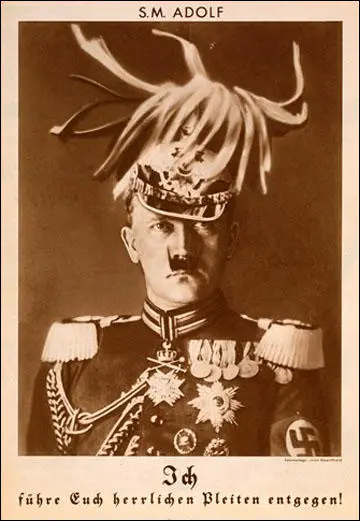
(Copyright The Official John Heartfield Exhibition & Archive)
The behaviour of the NSDAP became more violent. On one occasion 167 Nazis beat up 57 members of the German Communist Party in the Reichstag. They were then physically thrown out of the building. The stormtroopers also carried out terrible acts of violence against socialists and communists. In one incident in Silesia, a young member of the KPD had his eyes poked out with a billiard cue and was then stabbed to death in front of his mother. Four members of the SA were convicted of the rime. Many people were shocked when Hitler sent a letter of support for the four men and promised to do what he could to get them released. (111)
Incidents such as these worried many Germans, and in the elections that took place on 6th November, 1932 the support for the Nazi Party fell and the number of seats in the Reichstag was reduced from 230 to 196. The German Communist Party made substantial gains in the election winning 100 seats. Hitler used this to create a sense of panic by claiming that German was on the verge of a Bolshevik Revolution and only the NSDAP could prevent this happening. (112)
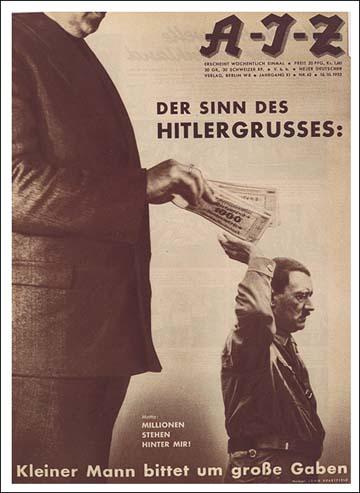
(Copyright The Official John Heartfield Exhibition & Archive)
A group of prominent industrialists, including Fritz Thyssen, Albert Voegle and Emile Kirdorf, who feared such a revolution, had a meeting to discuss this issue and after agreeing on a united political strategy, sent a petition to Paul von Hindenburg asking for Hitler to become Chancellor. On 19th November, President Hindenburg met with Hitler but they failed to get agreement and Kurt von Schleicher was appointed chancellor. (113)
In an effort to undermine Hitler, Schleicher offered the vice-chancellorship of Germany to Gregor Strasser. Hitler was furious and began to abandon his strategy of disguising his extremist views. In one speech he called for the end of democracy a system which he described as being the "rule of stupidity, of mediocrity, of half-heartedness, of cowardice, of weakness, and of inadequacy." (114)
On 4th January, 1933, Adolf Hitler had a meeting with Franz von Papen and decided to work together for a government. It was decided that Hitler would be Chancellor and Von Papen's associates would hold important ministries. "They also agreed to eliminate Social Democrats, Communists, and Jews from political life. Hitler promised to renounce the socialist part of the program, while Von Papen pledged that he would obtain further subsidies from the industrialists for Hitler's use... On 30th January, 1933, with great reluctance, Von Hindenburg named Hitler as Chancellor but refused him extraordinary powers." (115)
References
(1) Rudolf Olden, Hitler the Pawn (1936) page 160
(2) Alan Bullock, Hitler: A Study in Tyranny (1962) page 122
(3) Ian Kershaw, Hitler 1889-1936 (1998) page 225
(4) Konrad Heiden, Hitler: A Biography (1936) page 204
(5) Henry Ford, Dearborn Independent (22nd May, 1920)
(6) Norman Cohn, Warrant for Genocide: The Myth of the Jewish World-Conspiracy (1966)
(7) John Simkin, Hitler (1988) page 22
(8) Alan Bullock, Hitler: A Study in Tyranny (1962) page 122
(9) Ron Rosenbaum, Explaining Hitler: The Search for the Origins of his Evil (1998) page 55
(10) Adolf Hitler, Mein Kampf (1925) page 468
(11) James Pool, Who Financed Hitler: The Secret Funding of Hitler's Rise to Power (1979) page 91
(12) Adolf Hitler, Mein Kampf (1925) page 286
(13) Adolf Hitler, Mein Kampf (1925) page 66
(14) André Gerrits, The Myth of Jewish Communism: A Historical Interpretation (2009) page 78
(15) The Jerusalem Post (20th June, 2018)
(16) Adolf Hitler, Mein Kampf (1925) page 481
(17) James Douglas-Hamilton, The Truth About Rudolf Hess (2016) page xliii
(18) James Pool, Who Financed Hitler: The Secret Funding of Hitler's Rise to Power (1979) page 126
(19) Neil Baldwin, Henry Ford and the Jews: The Mass Production of Hate (2001) pages 182-183
(20) Kurt Ludecke, I Knew Hitler (1938) pages 192-193
(21) James Stewart Martin, All Honorable Men (1950) page 46
(22) Adolf Hitler, speech in Berlin (December, 1924)
(23) Alan Bullock, Hitler: A Study in Tyranny (1962) page 126
(24) John Simkin, Hitler (1988) page 25
(25) James Pool, Who Financed Hitler: The Secret Funding of Hitler's Rise to Power (1979) pages 253-254
(26) Otto Strasser, Hitler and I (1940) pages 66-67
(27) David Pietrusza, 1932: The Rise of Hitler and FDR (2016) page 101
(28) Adolf Hitler, Speeches of Adolf Hitler (2006) page 460
(29) Joseph Goebbels, diary entry (12th July, 1925)
(30) Konrad Heiden, Hitler: A Biography (1936) pages 117-118
(31) James Pool, Who Financed Hitler: The Secret Funding of Hitler's Rise to Power (1979) page 214
(32) John Simkin, Hitler (1988) page 25
(33) Ron Rosenbaum, Explaining Hitler: The Search for the Origins of his Evil (1998) page 105
(34) Rodney Collin, The Spectator (19th January, 1934)
(35) Ron Rosenbaum, Explaining Hitler: The Search for the Origins of his Evil (1998) page 111
(36) Cate Haste, Nazi Women (2001) page 38
(37) Ian Kershaw, Hitler 1889-1936 (1998) page 284
(38) Ronald Hayman, Hitler & Geli (1997) page 94
(39) Ron Rosenbaum, Explaining Hitler: The Search for the Origins of his Evil (1998) page 114
(40) Adolf Hitler, letter to Maria Reiter (8th February 1927)
(41) Günter Peis, Time Magazine (29th June, 1959)
(42) Ron Rosenbaum, Explaining Hitler: The Search for the Origins of his Evil (1998) page 114
(43) Lothar Machtan, The Hidden Hitler (2001) page 159
(44) Louis L. Snyder, Encyclopedia of the Third Reich (1998) page 329
(45) Andrew Mollo, To The Death's Head: The Story of the SS (1982) page 16
(46) Adrian Weale, The SS: A New History (2010) pages 45-46
(47) James Pool, Who Financed Hitler: The Secret Funding of Hitler's Rise to Power (1979) pages 138-141
(48) Ian Kershaw, Hitler 1889-1936 (1998) page 299
(49) Otto Dietrich, With Hitler on the Road to Power (1934) pages 12-13
(50) James Pool, Who Financed Hitler: The Secret Funding of Hitler's Rise to Power (1979) page 288
(51) John Simkin, Hitler (1988) pages 27-28
(52) James Taylor and Warren Shaw, Dictionary of the Third Reich (1987) page 229
(53) Otto Wagener, Hitler - Memoirs of a Confidant (1985) page 222
(54) Joachim Fest, Hitler (1973) page 236
(55) Bridget Hitler, The Memoirs of Bridget Hitler (1979) page 59
(56) Angela Lambert, The Lost Life of Eva Braun (2006) page 103
(57) Robert Waite, The Psychopathic God (1977) page 237
(58) Ian Kershaw, Hitler 1889-1936 (1998) page 352
(59) Ernst Hanfstaengel, Hitler: The Missing Years (1957) page 162
(60) Nerin E. Gun, Eva Braun: Hitler's Mistress (1969) page 20
(61) Ronald Hayman, Hitler & Geli (1997) page 107
(62) John Simkin, Hitler (1988) pages 32-33
(63) Alan Bullock, Hitler: A Study in Tyranny (1962) page 151
(64) Konrad Heiden, Hitler: A Biography (1936) page 274
(65) Harold Harmsworth, 1st Lord Rothermere, The Daily Mail (24th September, 1930)
(66) James Pool, Who Financed Hitler: The Secret Funding of Hitler's Rise to Power (1979) page 314
(67) Louis P. Lochner, Tycoons and Tyrant: German Industry from Hitler to Adenauer (1954) page 111
(68) Colin Cross, Adolf Hitler (1973) page 162
(69) Rudolf Olden, Hitler the Pawn (1936) page 270
(70) John Simkin, Hitler (1988) page 34
(71) Angela Lambert, The Lost Life of Eva Braun (2006) page 117
(72) Nerin E. Gun, Eva Braun: Hitler's Mistress (1969) page 20
(73) Ronald Hayman, Hitler & Geli (1997) page 111
(74) Glenn B. Infield, Eva and Adolf (1974) page 44
(75) Ronald Hayman, Hitler & Geli (1997) page 145
(76) Otto Strasser, interviewed by officials of the US Officer of Strategic Studies (May, 1943)
(77) Heinrich Hoffmann, Hitler was my Friend (1955) page 126
(78) Ernst Hanfstaengel, Hitler: The Missing Years (1957) page 164-165
(79) Ian Kershaw, Hitler 1889-1936 (1998) page 353
(80) Ronald Hayman, Hitler & Geli (1997) page 120
(81) Christa Schroeder, He Was My Chief: The Memoirs of Adolf Hitler's Secretary (1985) page 213
(82) Ronald Hayman, Hitler & Geli (1997) page 154
(83) Nerin E. Gun, Eva Braun: Hitler's Mistress (1969) page 18
(84) Ernst Hanfstaengel, Hitler: The Missing Years (1957) page 168
(85) Ronald Hayman, Hitler & Geli (1997) page 159
(86) Georg Winter, statement to the German police (19th September, 1931)
(87) Cate Haste, Nazi Women (2001) page 46
(88) Ronald Hayman, Hitler & Geli (1997) page 162
(89) The Münchener Neueste Nachrichten (20th September 1931)
(90) The Münchener Post (21st September, 1931)
(91) Ronald Hayman, Hitler & Geli (1997) page 160
(92) Adolf Hitler, statement published in The Münchener Post (21st September 1931)
(93) Dr. Muller, police report (22nd September, 1931)
(94) Ronald Hayman, Hitler & Geli (1997) page 176
(95) Heinrich Hoffmann, Hitler was my Friend (1955) page 130
(96) Ronald Hayman, Hitler & Geli (1997) page 189
(97) Otto Wagener, Hitler - Memoirs of a Confidant (1985) page 357
(98) Ian Kershaw, Hitler 1889-1936 (1998) page 354
(99) Konrad Heiden, Hitler: A Biography (1936) pages 307-308
(100) Ernst Hanfstaengel, Hitler: The Missing Years (1957) pages 167-168
(101) Ronald Hayman, Hitler & Geli (1997) page 180
(102) Alan Bullock, Hitler: A Study in Tyranny (1962) page 394
(103) Ernst Hanfstaengel, Hitler: The Missing Years (1957) page 100
(104) Konrad Heiden, The Führer – Hitler's Rise to Power (1944) page 352
(105) Louis L. Snyder, Encyclopedia of the Third Reich (1998) page 304
(106) Alan Bullock, Hitler: A Study in Tyranny (1962) page 213
(107) Franz von Papen, Memoirs (1952) page 162
(108) Ian Kershaw, Hitler 1889-1936 (1998) page 370
(109) Joseph Goebbels, diary entry (31st July, 1932)
(110) British Ambassador Horace Rumbold, message to John Simon, the British foreign secretary (3rd August 1932)
(111) Alan Bullock, Hitler: A Study in Tyranny (1962) page 218 (110) Colin Cross, Adolf Hitler (1973) page 212
(112) John Simkin, Hitler (1988) page 36
(113) James Pool, Who Financed Hitler: The Secret Funding of Hitler's Rise to Power (1979) pages 446-456
(114) Colin Cross, Adolf Hitler (1973) page 212
(115) Louis L. Snyder, Encyclopedia of the Third Reich (1998) page 154
John Simkin
